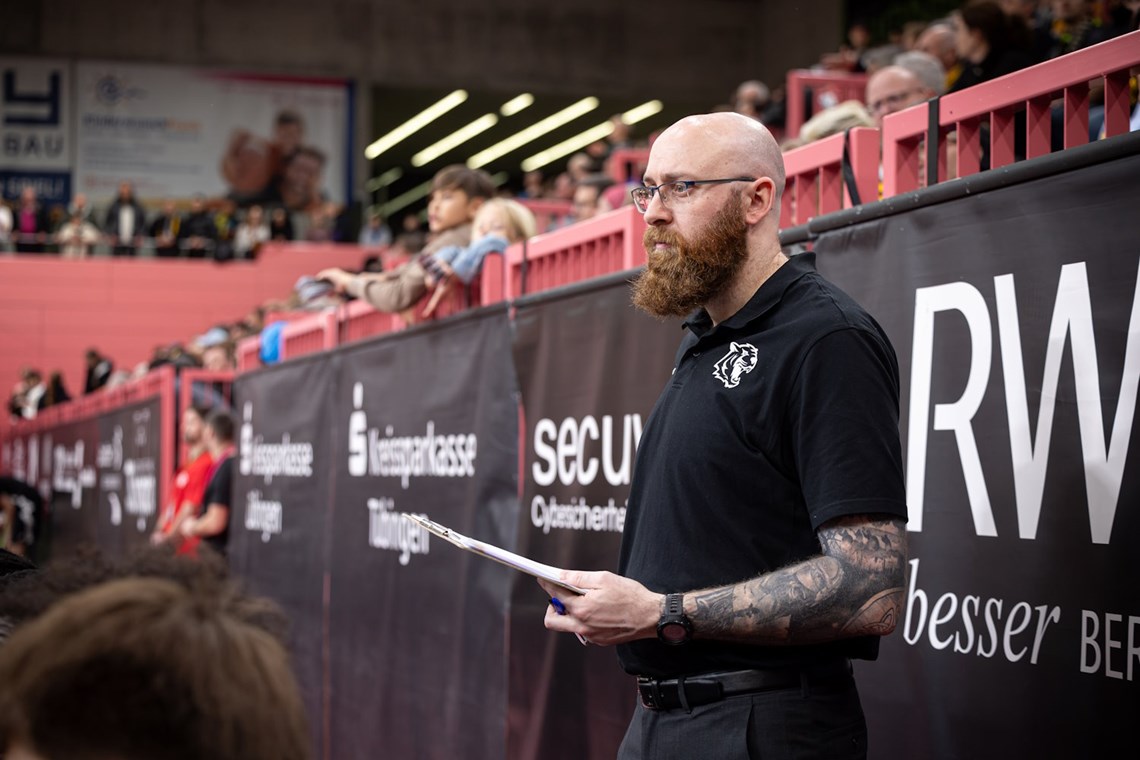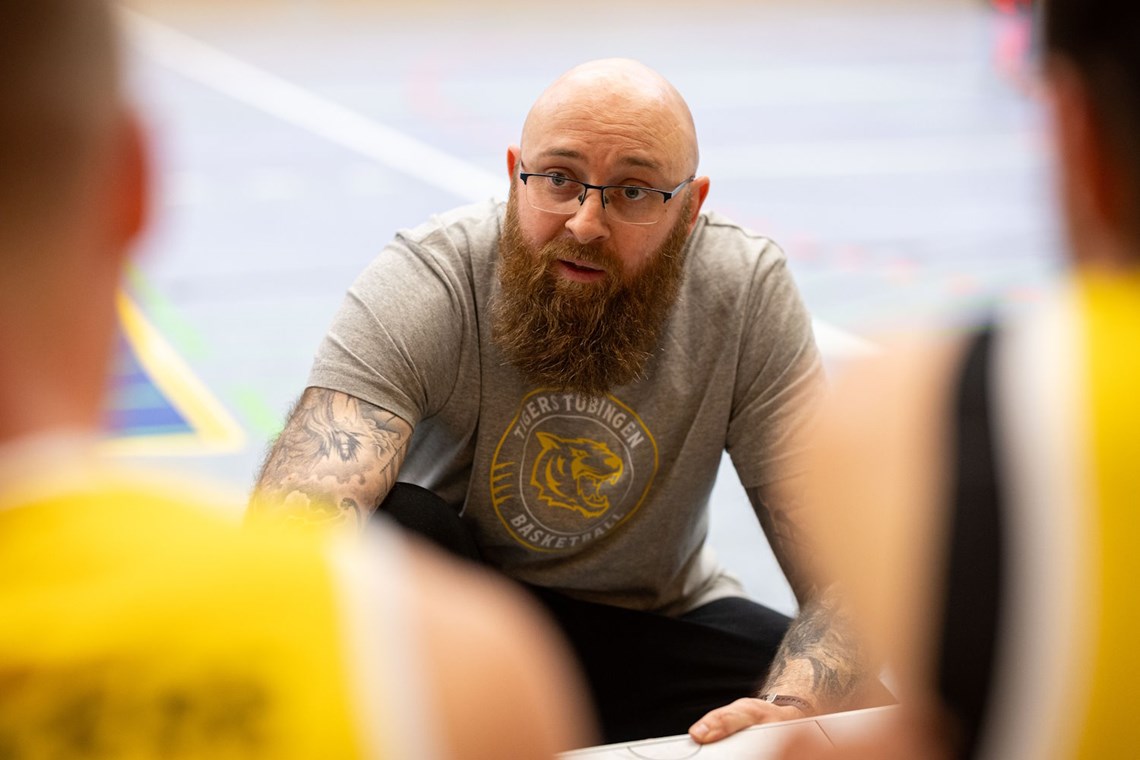
After finishing his maiden season coaching in Germany's Pro A and Regionalliga leagues, we caught up with the 34-year old to discuss how he started his coaching career, his stops along the way, and what advice he'd pass on to other coaches looking to follow in his foot steps.
The opening part covered Culley's introduction to coaching, how he started his journey and his eventual move to the South East and Kent Crusaders, and last week's piece covered Culley's time at Myerscough and his National Teams work.
This article is the penultimate instalment in the four-part series with the former Myerscough man, with the final article coming next two Friday (13 June).
.
.
As most coaches will know, having an idea is one thing, capitalising on it is very much another. Once again though, networking and coincidence opened the door.
“I reached out to a lot of different people, to find out what that landscape looks like. It was all very new to me,” confesses Culley.
“Since Rick passed, I’ve been very fortunate to build a relationship with Tim Lewis; he’s been a rock for me. He took over that role, and I think it’s because Rick did the same for him and gave him opportunities as well.
“We mentioned Germany, so Tim made some enquiries there after coaching in Germany himself. By chance, there was an Italian coach that I knew from the EuroLeague Academy, Carlo Finetti, and I reached out to him.
“I said ‘Look, you're an Italian coaching in Germany. How did you do it?’ And he said, ‘Just come here!’
“I was like, ‘What do you mean?!’ And he said to just come and work in Germany with him. It was pretty surreal!
“I sent him my resume and he passed it on their Sport Director, Eric Detlev. It's a small world, as Eric coached against Tim Lewis when he was in Germany. So they knew each other, one thing led to another, and next thing you know, there's an offer for me to come here to Tübingen.”

A traditional university city, Tübingen wasn’t dissimilar to Culley’s previous stops in Kent and Myerscough, and with a population of just under 90,000, it isn’t a sprawling metropolis, either.
Located less than 20 miles from state capital Stuttgart, it ticked a lot of boxes for helping Culley to realise his dream. The move brought challenges, as any move across the globe would, but basketball, like English, has proved to be fairly universal.
“The language thing has been OK. There are 30,000 students here for most of the year, four really big hospitals are linked to the campus so there’s a lot of international students coming in and that means there’s more English spoken than in most places.
“I think the first couple of weeks, that was the hardest. Just because you don't have the home comforts and the routine. Where you get your groceries, where you go for coffee, those kinds of things, you know?
“I didn't know any of that, and there was a lot of Google Translate to figure stuff out.
“Once I got coaching, I was surprised that, especially at the younger levels, how well the kids speak English.
“At the younger the age groups, I try to simplify the language I use. And there's been times when if a kid doesn't understand, more than likely one of his team-mates does, and will speak in German, and that hasn't been an issue.
“On the Pro team we've got five imports, so our head coach, he coaches in English. We have the German players as well, but everything's in English. Sometimes it's quicker for him to say something to a German player or to the other assistant who's German in German, that makes sense, but it hasn’t been a problem.”

Even before he joined the Tigers, the German outfit were in a state of transition. Between the agreement for him to join the club and Culley taking up post in May 2024, the head coach and his assistant Finetti left the team to join USC Heidelberg, a top-flight Bundesliga side.
Tübingen had slipped into the second tier, Pro A, following the 2023/24 campaign, prompting the coaching departures, and relegation also meant a serious roster shift with 12 new players for the Pro A side as well.
It was an early reminder that working at a pro level certainly had differences to Myerscough and the EABL, and it’s something Culley is reminded of frequently across his daily roles.
“It was very eye opening, being here and seeing all the things that our head coach has to deal with,” he says.
“You're not getting fired in England. If you lose a couple of games, it happens. We lost a couple of games here, and you could feel the tension in the office, the tension around the facility. It's just different, very different.
“That said, I am very lucky. I think the situation right now, it’s like the 'Goldilocks effect'. Right in the middle. It's the transition between elite, but also development.
“I have the assistant role with Pro A and that’s professional basketball. A number of coaches have been fired in the league already this year, and I see all the pressures that our head coach is under and all the decisions he has to make, because I'm involved in everything, the meetings and the discussions and the day-to-day flow.
“But I also have that bit in the middle where I get to head coach our farm team, so our development men's team in Regionalliga, and I'm coaching our U18s. I still get to do what I'm well known for, youth development, player development, and the skills I honed at Myerscough and in the EDP, alongside that taste of professional basketball.
“It's that nice transition for me, and I think my plan over the next couple of years is to do more and more with the pro side of things to really get a feel for it.”
Despite his split role, Culley wasn’t immune from the pressures that a higher level of the sport can bring.
With the Regionalliga side, the club’s development outfit, slipping to a 1-9 record in December 2024, Culley was finding life difficult, and it wasn’t until after things improved that he discovered the potential realities that a performance business can bring.
“It's probably the most I've lost ever in my life, and I was not in a good place,” Culley recalls, with a rueful smile.
“Fortunately, we turned it around. We had a much better second half and finished 15-11.
“The Sport Director came to me after the improvement and said, ‘If you didn’t know, as a Pro A club, the German Federation’s rules say we must have a Regionalliga side, so we couldn’t have afforded to be relegated.’
“The fine if we were relegated? €10,000. So yeah, it’s just slightly different over here!”
.
All image credit - Dennis Duddek
